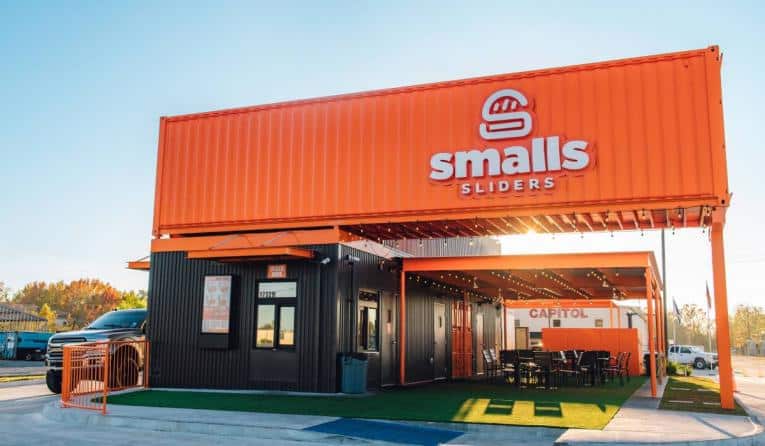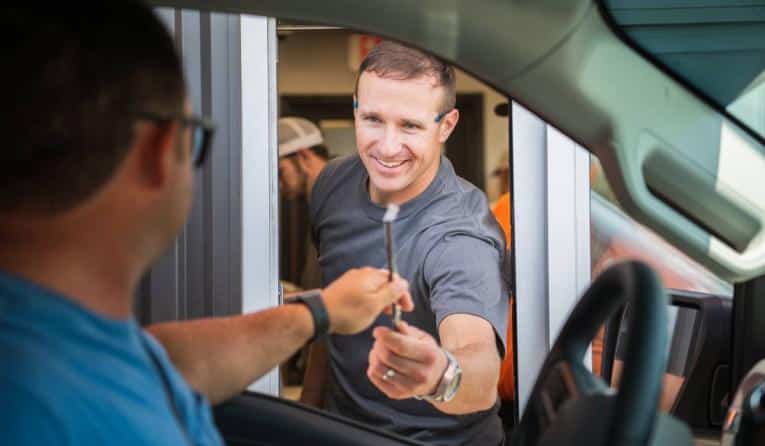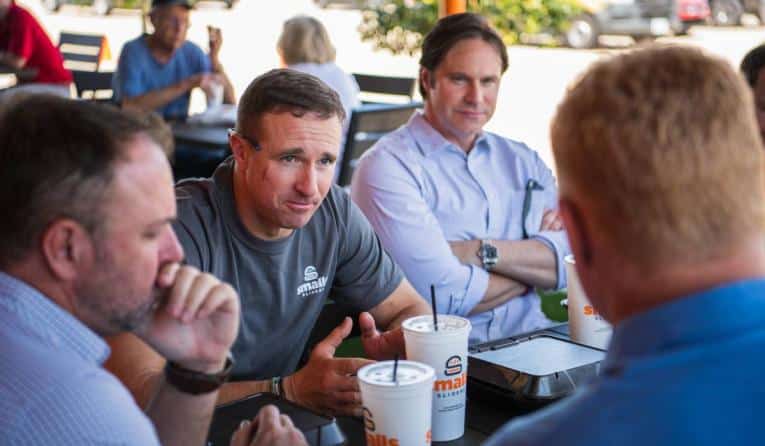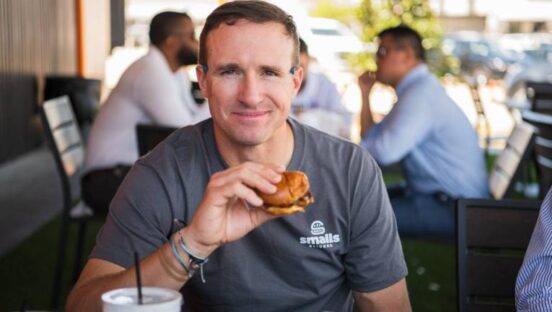Twelve years ago, Drew Brees was sitting in a Jimmy John’s near Purdue University, enjoying his favorite order (a No. 9, no cheese, add hot peppers) for what felt like the first time in ages.
He’d been a devoted fan for a decade, starting with his early days at the school’s freshman dorm, when he relied on the sandwich to fuel late-night study sessions. But neither San Diego, where he started his pro-football career with the Chargers, nor New Orleans, where he cemented his legacy with the Saints, had any stores.
“I was ordering that sandwich three times a week during my college days,” Brees says. “After I left, I could only get my Jimmy John’s when I was visiting Purdue, which was only a couple times a year. Ten years after leaving college, I was back in the shop at Purdue, taking a bite out of a No. 9, and I finally said, ‘That’s it. I have to bring this to New Orleans.’”
He called a former teammate who worked in the corporate office and asked what he needed to do to get the sandwich chain down in The Big Easy. As luck would have it, the company had just opened up the territory for franchising.
That call was the first step in a journey that would see Brees become a franchisee, co-owner, or investor in a growing number of franchises, including Jimmy John’s, Dunkin’, and Everbowl, to name a few. It also set him on the path toward Smalls Sliders, an emerging quick-service chain on the precipice of explosive growth.
The brand serves a hyper-focused menu of cheeseburger sliders from a roughly 800-square-foot shipping container affectionately dubbed “the can.” Brees is gearing up to open his first franchised location later this year, but he’s been at the forefront since day one. The former NFL quarterback and future Hall of Famer is an initial investor and co-owner alongside Brandon Landry, the founder of Walk-On’s Sports Bistreaux.
This isn’t the first time they’ve teamed up to drive the rapid expansion of a restaurant born in the Bayou State. Brees has been Landry’s partner at Walk-On’s since 2015. The sports bar had three corporate locations and was looking to grow through franchising when the pair first linked up eight years ago. Brees bought into the business on the franchisor side, taking a 25 percent stake and leveraging his perspective as a Jimmy John’s operator to support the brand’s rapid franchise expansion. Since then, the footprint has grown to more than 75 locations nationwide.
Brees says all of his business ventures begin with a genuine affinity for the brand. With Walk-On’s, it was the elevated menu, stellar customer service, and “incredible vibe” within the restaurant that caught his attention. He first encountered the brand after Landry opened a location in downtown New Orleans.
“I’d always wanted to open up a sports bar concept with a focus on great food,” he says. “The first time I walked into that Walk-On’s, I looked around and said, ‘I don’t think I could build it any better than it’s been built right here. I need to figure out who did this.’”
Brees reached out to Landry to find out more about the business. He learned that the name stemmed from the founder’s time as a walk-on basketball player at LSU. Unlike star players on scholarship, Landry was an unrecruited and unsigned athlete. That meant he had to work hard and hustle to keep his spot.
Landry used that walk-on mentality–putting the team above everything else and persevering no
matter what hand you’re dealt–as a theme to run his sports bar. The result was a people-first culture that feeds the organization from the top down and starts with humble leadership.
“That was something I learned through my time as an athlete, too,” Brees says. “It’s all about having the right people in the right places, and making sure everybody embraces their role and understands that they’re part of something much greater than themselves.”


Laying the foundation
Five years ago, Brees and Landry were on an airplane heading to the grand opening of a new Walk-On’s location. That’s when Landry laid out his vision for a sliders-themed restaurant.
“The idea started with the fact that sliders were one of the best selling items on the menu,” Brees says. “Brandon told me, ‘I think we’ve got something there. We could open up a sliders concept that has a really simple menu, but let’s take it to the next level with these repurposed shipping containers as the look and feel of the brand.’”
Brees jumped on the opportunity to help build something from the ground up. He came on board as an initial investor and put up the capital for the proof-of-concept restaurant, rounding out a team of entrepreneurs that also included Landry’s nephew, Jacob Dugas, and LSU professor Scott Fargason.
The team built Smalls with franchisees in mind. It’s all about keeping things simple and focused, starting with the limited menu centered around the namesake product. Customers choose from four combos, including one, two, three, or four sliders–made with premium beef and proprietary sauces–paired with fries, drinks, and milkshakes.
“We have less than 10 food ingredients in the restaurant, where a lot of quick-service restaurants have several hundred ingredients that they have to manage,” says chief development officer Richard Leveille. “Operators are really excited about that.”
Operators also are excited about the brand’s modular design. The shipping containers are equipped with walk-up windows, drive-thru lanes, and outdoor patios in lieu of indoor dining rooms. They operate with around half of the labor typically required in an average quick-service restaurant, and routine expenses like utilities and dumpster requirements are lower.
One of the biggest advantages of housing a brand in a shipping container is real estate flexibility since the footprint only requires around half an acre of land.
“There are companies out there that are well-capitalized and have great concepts, but they’ve been slow to grow in certain markets because they’re picky on real estate,” Leveille says. “We have to be picky, too, but most concepts can’t fit on half an acre, so our competition for real estate isn’t the traditional quick-service segment.”
The cans also enable faster speed to market. They’re manufactured, permitted, and pre-inspected in Florida before being shipped across the country and dropped on an outparcel. Leveille says the process shaves anywhere from three to eight weeks off the typical construction schedule.
Opening the floodgates
Smalls opened its first can in September 2019 in Baton Rouge, not far from the original Walk-On’s restaurant. Since then, it’s grown to nine units throughout the state as of mid-July. Brees says the units are consistently outperforming expectations, opening “anywhere from $65,000 to $85,000 a week.” The system is tracking a solid AUV of over $2 million.
“When we started, we were thinking that if we could just do around $1.3 million in sales, we’d have a really good business,” he says. “All of the sudden, our average units are doing over $2 million. We’re really honing in on the unit economics piece. Could we push that to $2.5 million? Could we push that to $3 million?”
Smalls was built with a certain level of transactions in mind, but the first few cans quickly blew past those projections. And while the brand isn’t dealing with the same overhead expenses as its peer set, it’s still taking steps to make the four-wall economic model as strong as possible. The team is continually looking for opportunities to improve operations and unlock efficiencies with an eye toward increasing throughput and further reducing costs.
The first unit had one grill and one drive-thru lane, but subsequent locations have multiple stations and two lanes to better meet demand. Smalls experimented with the placement of its drive-thru menu board and how it communicates with employees inside the can. It landed on a model where workers take orders outside face-to-face instead of through a speaker. The company also has worked to decouple its supply chain from Walk-On’s and procure products further out in advance.
“We’re hyper-focused on operations, on systems, and on getting the build-out costs as low as we can,” Brees says. “We’re developing extremely strong vendor relationships and making these units and the business model as profitable as possible. We’re looking at all of those things on a daily basis and continuing to refine even more as the days go by.”
“We can’t field the calls and the level of interest fast enough,” says Drew Brees, former NFL quarterback and franchisee of Smalls Sliders.


A big learning moment came last spring when the first franchised unit opened in Thibodaux, Louisiana. It was another debut that exceeded expectations, but the restaurant faced some product shortages and traffic problems that the company didn’t quite have the answers to.
“That unit just completely blew us away with the sales that it did, to the point where we said, ‘Whoa, this is even bigger than we ever thought it could be,” Leveille says. “We took a step back to really work on our foundation and make sure we’re offering franchisees world-class support.”
More pieces have come into place since then. Last summer, the brand secured an equity investment from 10 Point Capital, a firm with an established track record of helping founders create thriving franchise brands. It was a natural extension of an existing relationship between 10 Point, Landry, and Brees. They joined forces four years ago to accelerate growth across Walk-On’s franchise system.
The company relocated its headquarters from Baton Rouge to Atlanta to gain access to a deeper talent pool. It also tapped Maria Rivera as its new CEO. The former Krispy Kreme executive joined late last year and quickly got to work assembling a team of leaders that will drive the brand into the future. Since taking the helm in November, she’s rapidly bolstered the support center staff and filled a slew of key positions across finance, IT, real estate, operations, marketing, technology, and more.
Smalls also finalized a growth plan that will see it head east toward the new headquarters and franchise support center. The expansion pipeline for 2023 targets markets throughout Alabama, Arkansas, Florida, Georgia, Louisiana, Mississippi, North Carolina, South Carolina, and Tennessee. The goal is to sell a sizable portion of those territories in the Southeast by the end of the year. That shouldn’t be a challenge, given the surge of demand Smalls is generating from potential franchisees.
“We can’t field the calls and the level of interest fast enough,” Brees says.
Those calls are coming from seasoned, multi-unit operators. Smalls currently has more than 60 units in the development pipeline, but that number is expected to reach triple digits by the time the calendar flips over to 2024. That will likely mean 10-20 franchisees that come in and commit to a territory.
“I’ve been involved with four or five franchise concepts in my life and consulted with others, and I’ve never seen this type of momentum,” Leveille says. “Our ability to meet the numbers we’re looking for–which are potentially several hundred units in our pipeline by the end of the year–I’m completely confident with.”
In June, Smalls signed the lease for a new location at Clearview City Center in Metairie, Louisiana, part of the greater New Orleans metropolitan area. The can will drop in Q4 and is part of a four-unit agreement with Brees. Jason Loerzel and Ben Smith, his franchise partners and former college football teammates, will join as co-owners. Their second can is expected to drop in the first half of 2024.
“Things are definitely moving,” Brees says. “Just like with Jimmy John’s and all the other businesses I’ve been involved in, I want to bring them to New Orleans. I always want to bring the brands that I love to the city that I love.”
The Metairie location is one of a dozen or so new cans expected to drop in 2023. Expansion also is slated for several markets in Louisiana as well as Flowood, Mississippi, which will be the brand’s first can outside of its home state. That should push the footprint to around 20 units. From there, the pace of growth could accelerate to 20-30 new openings annually as the company works toward its long-term goal of reaching over 400 locations via franchising.
With a high-quality craveable product, a community-driven culture, and strong unit-level economics, Brees believes that level of organic growth is within reach. The final pieces are falling into place and the floodgates are about to open.
“We started from scratch in building this business and putting it in a position where we have the support structure in place to guide franchisees and really scale the brand,” he says. “What that takes is great leadership. We’ve found the absolute perfect person with Maria Rivera as our CEO. She’s put together an incredible team that’s going to help grow this brand to be a national presence and the best-in-class in our segment. We want to be the best-in-class not just with the sliders we serve and the customer experience we provide, but also with the work environment, both in the corporate office and in the can, and in everything else that we do.”








